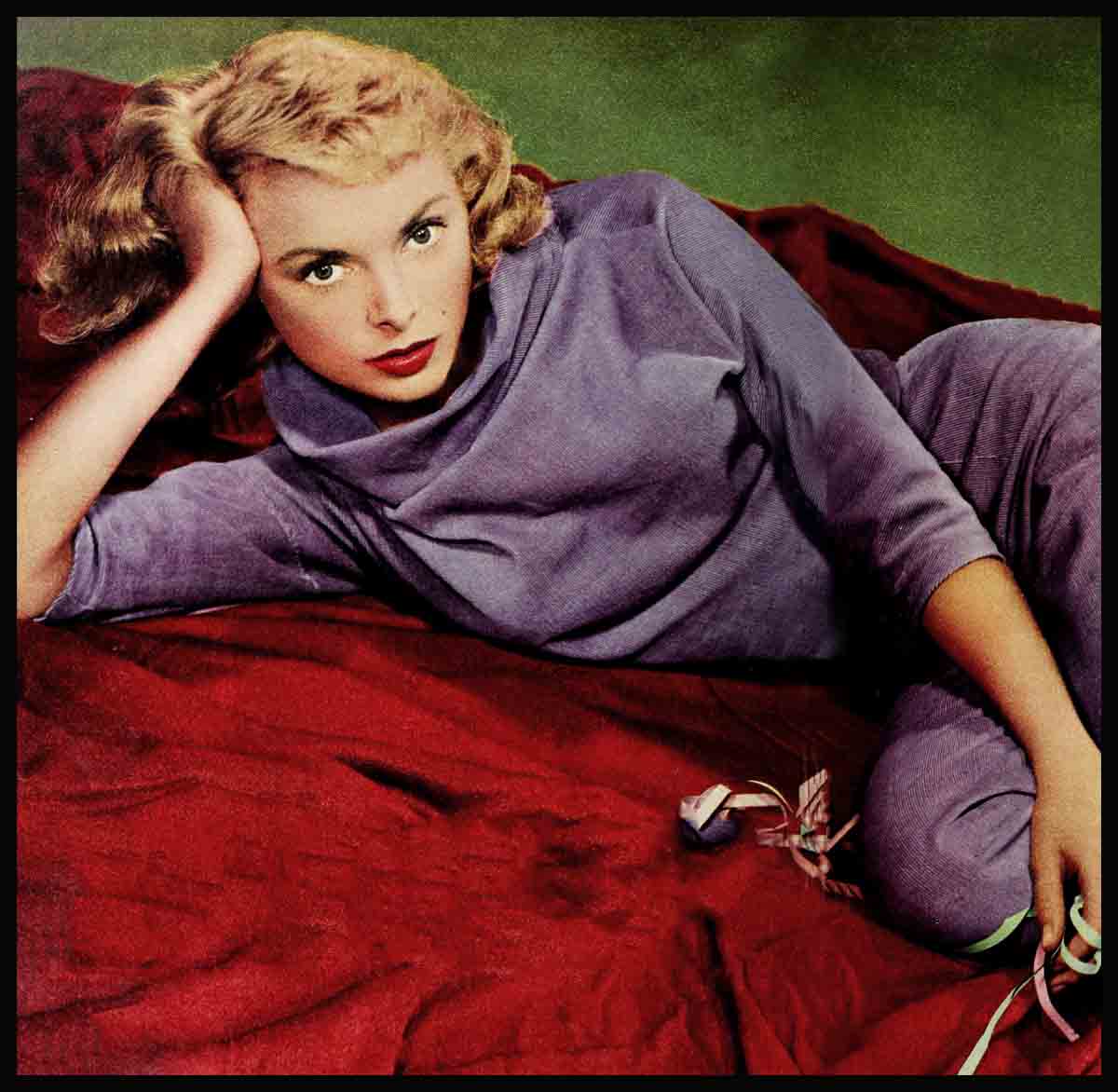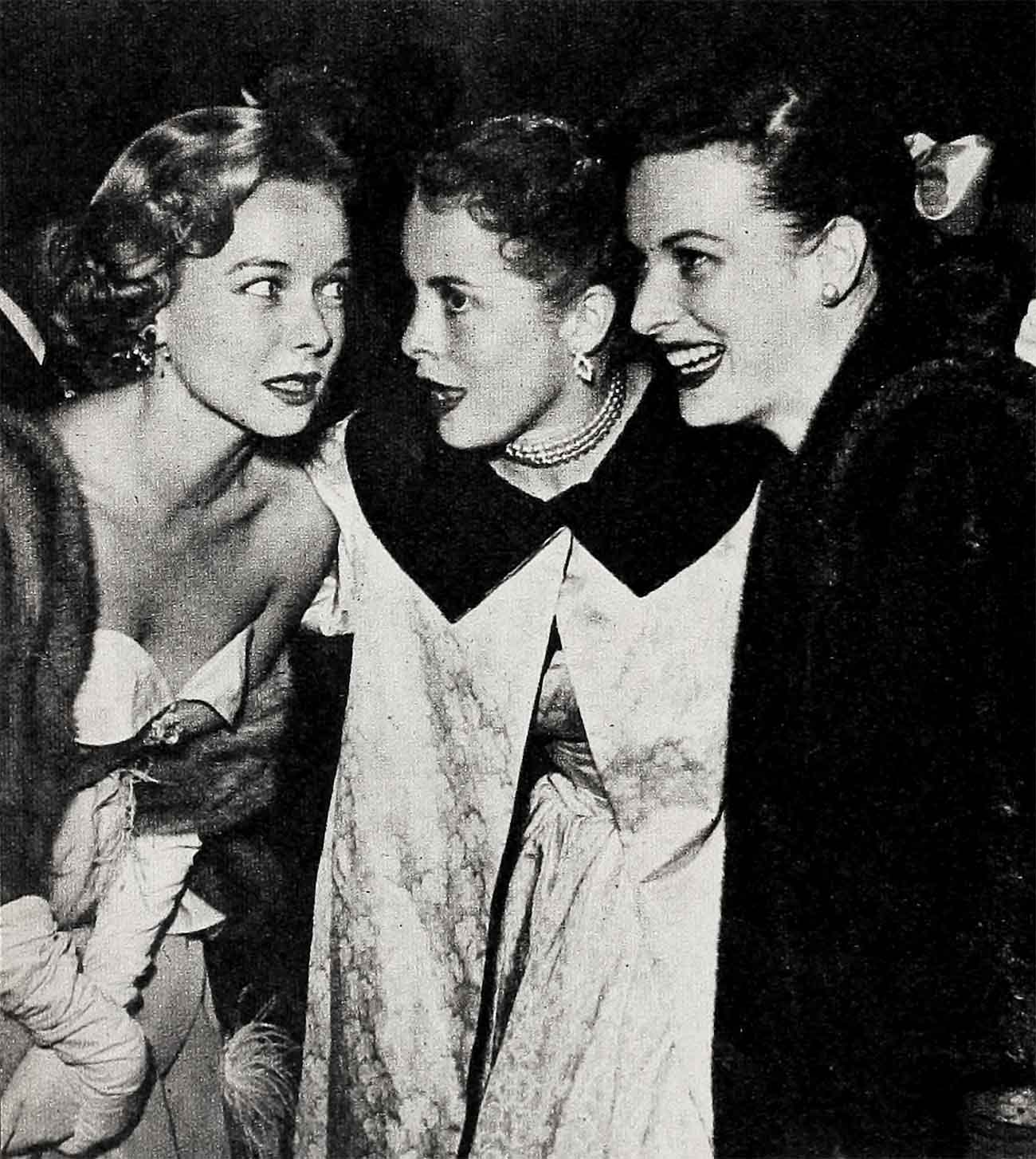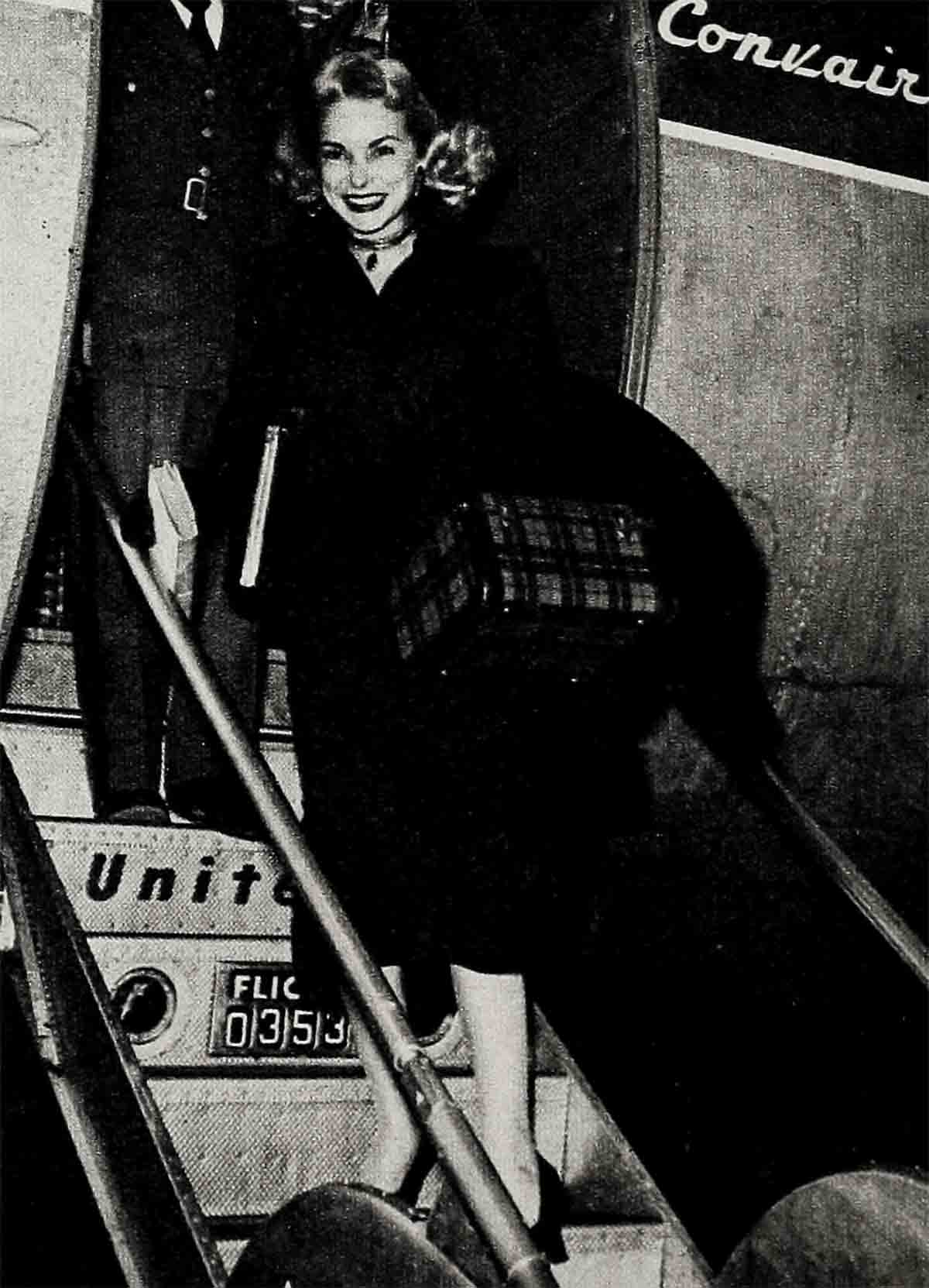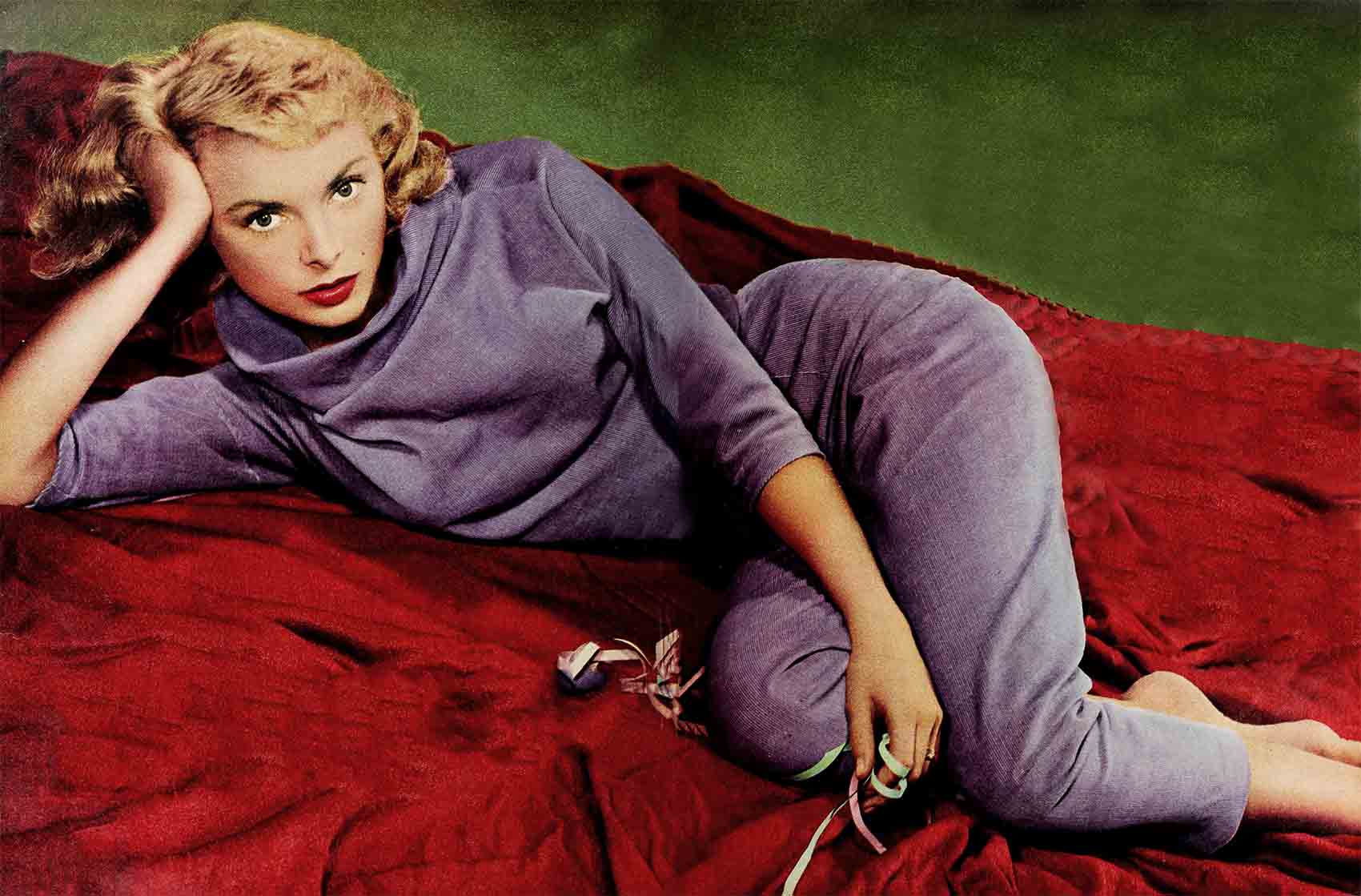
A Life Of Her Own—Janet Leigh
When Mr. and Mrs. Tony Curtis moved from Beverly Hills to Coldwater Canyon, every phase of the operation was duly recorded by a magazine photographer. Legging it over to Beverly, hot little camera in hand, he found his glamorous subject engaged in a most unglamorous chore. “Hi!” Janet said with a bright and wholly unself-conscious smile. She was at the kitchen sink, furiously scrubbing ashtrays.
Which brings up two points. First, the kind of person Janet Leigh is. And second, the fact that since her marriage to Tony Curtis on June 4, 1951, there has been such an inundation of stories about what a cunning little couple they make, such careful documentation of their domesticity that their individual personalities have somehow blurred into the background. Janet without Tony? Ridiculous! Like Siamese twins, their destinies are as one.
People who didn’t know her before her marriage haven’t the faintest idea what kind of person Janet is. Those who did know her tend to forget. That she was already a star when she met Tony, for instance. That without dramatic training, without even the experience of playing bit parts, she stepped into the lead of a major production, The Romance Of Rosy Ridge, and gave a fine account of. herself. Her press clippings say that at the time of her marriage she was earning an assured $43,000 annually, which is, no doubt, an exaggeration. Probably it was only $40,000. But she was and is a star in her own right and, believe it or not, there is a Janet without Tony.
Janet Leigh, individual, is a perfectionist of the most extreme sort. Early in her career she said that she never entertained any ambitions to be an actress, adding, “I suppose every girl thinks of herself as a future housewife. I never thought beyond that.” If she had stayed with that mundane dream, hers would have been a house capable of passing military inspection at any hour. The day they moved from Beverly Hills, Janet had hired some people to do the work. Her mother was also present, and Mrs. Morrison is not inexperienced in such things. But, no. Janet had to scrub the ashtrays herself; otherwise, she would not be satisfied in her own mind that she was leaving the house absolutely spotless, even to such a minute detail.
She supervised the packing, memorizing the contents of every crate, box, suitcase and odd-shaped package; arriving at the new house, she knew exactly where she wanted every last item stowed away. This meticulous approach to onerous jobs is laudable, but it is also a source of trial and tribulation—in minor key—to the people around her. “Sweetie,” they plead, “quit bustling. Sit down for five minutes.”
She may sit, but she’ll squirm. “What I want my home to be is a place where people can do whatever they like. If what they like to do makes a mess, let ’em mess up the whole joint. It’s all right by me. But my fun is cleaning up, and if I let them do what they want, I think they ought to let me have my kind of fun, too. The thing is, I haven’t convinced anybody that straightening up is fun; they always feel guilty about my doing it.”

Her striving for perfection carries over into every facet of Janet’s life. “I think she’s the only actress in Hollywood really qualified to write advice stories for the kids,” commented one of her friends, “because Janet actually practices what she preaches. She never takes off a blouse and hangs it up, thinking she can get by wearing it one more time. She never says, ‘I can let my hair go one more day.’ With her it’s as if there weren’t going to be any tomorrow. Whatever can be done by hand is washed the minute it comes off her back; the other things go to the cleaner immediately. Her hair, her nails are always done; grooming isn’t a sometimes thing with Janet.”
It carries over into her career: she has to be as nearly perfect in every role as Janet Leigh can be. She’ll accept any part within reason, provided it’s different from the last one, and she’ll enter into it with awesome intensity. “This kid is going to kill herself,” one worried studio executive said, watching her work. “She has the drive of a young Crawford without the physical stamina to bear up under it.”
Worrying about Janet is commonplace in the movie world. She is unquestionably frail, and over and over you hear that she has gotten much too thin again. This Janet denies. “My weight doesn’t ever vary very much. What happens is that tension shows first in my face and makes me look sort of hollow-cheeked. Right now people are saying that I’ve put on a few much-needed pounds, but I haven’t gained an ounce. I’ve just been in Palm Springs, resting and relaxing, and the tension is gone from my face.” She is sporting a desert tan and a few becoming freckles on the nose.
The tension appears when she demands too much of herself, asking more than she believes in her heart that she can give. This is not a smug girl by the straining of anyone’s imagination. She knew from nothing about dancing when RKO signed her for Two Tickets To Broadway, so she spent five months training under Marge and Gower Champion. In the brilliant young Mr. Champion Janet met a perfectionist every bit as dedicated as she is. She should have gone into the production with utter confidence, knowing he would never let her try until he was sure that her performance would be flawless, but Janet stayed scared.
She still isn’t sure. In making My Sister Eileen, she was a living example of aplomb when she danced with Bob Fosse—but whenever she had a solo routine to do, her assurance faded fast. She was still just plain scared she wouldn’t do it perfectly and, typically, she admits it.

The kind of person Janet is thinks about other people. One of the grim facts of life about a movie set is that there is never a place to sit; the moment one leaves a seat, someone else snatches it. This was an occupational hazard about which Bob Fosse complained bitterly and justifiably. Being choreographer as well as a featured dancer in the picture, he was on his feet for interminable lengths of time, and when there was a respite, there never was an empty chair. Janet spent many a moment when she herself could have rested, forcing inert forms off their roosts for Bob. And more. She gave a party for the company of My Sister Eileenwhen the picture was finished. In the middle of her living-room floor, where it could not be missed, was a chair with the name of Bob Fosse on it. Partly in humor, yes, but mostly in understanding and apology for the fact that he had not had a chair of his own on the set.
The individual Janet has faults, which she is quick to admit. One is that while she can take fair criticism with more than her share of equanimity, she’s apt to snap her twig if she considers the words of her critic unwarranted. A good example is the time she and Tony were interviewed, a few months ago, by Edward R. Murrow on his Person To Person television program. This being an ad lib show, the way it would go was discussed only casually, Ed Saying, “I’ll ask you about this, and then you tell me—”
It usually works out splendidly, Mr. Murrow in the studio in New York, his guests wherever they might be across the country. This time there was a near-catastrophe. Due to some mechanical failure, the Curtises could neither see Murrow’s image on the monitor screen in their home nor hear his questions for twenty of the thirty minutes they were on live television. They went through it with crossed fingers, desperately hoping they remembered the sequence of questions, and afterward Ed Murrow said, “Under almost impossible conditions they came through like real troupers.” And he is not a loose man with compliments.
Some of Hollywood’s viewers saw nothing beyond the fact that the program had not gone off as smoothly as usual, however, and caustically blamed the Curtises. Janet still does a burn over that. “They could at least have asked what happened before they started roasting us!”
By now she ought to be used to it, because if there was ever a town in which you can’t win for losing, this is it. If a star fails to cooperate with just one writer or photographer, the word goes around that her head is still growing. If she gives up her precious free time to oblige everybody—and Janet had four whole days off from July till the end of last year—she’s publicity-mad. Miss Leigh is realistic about publicity, regarding it as a part of her job, just as performing before the camera is. She has always been extremely cooperative, so the inevitable happened. The very magazines for which she knocked herself out began to imply that the Curtises were a couple of hambones who couldn’t even be happy at home unless a camera was trained upon them. That’s for being nice. Said Janet to a newspaperman, “I finally got so mad that I composed a scorching letter to the writer of one of those stories. Then I had some pod correct the spelling and sent it off!”

It’s possible. Any number of exceedingly bright people, including some who earn their livelihood by putting words on paper, can’t spell c-a-r. And it’s a matter of record that Janet was an A student who had to devise ways and means of correcting the impression that she was a square; the other kids didn’t dig a pretty girl who actually liked school. She even cut classes one day just to prove how regular she was. And who got caught? Janet, of course, the one who hadn’t had enough experience at it not to get caught.
Anyhow, spelling wasn’t the subject that interested her most. From her father, an accountant, Janet inherited a quite un-girlish fascination with figures. She is still level-headed about numbers, especially those preceded by $. In explaining why she and Tony had rented the house in Coldwater Canyon, though last year they vowed that their next move would be into their own home, she said, “Once we started looking around, I realized how foolish it would be. We wouldn’t live in any of the houses we could afford to buy right now, and I think it’s very unwise for people our age to get into debt over their heads. Oh, sure, we live comfortably and drive crazy cars, but we aren’t buying any mansion. Things happen, situations change—who can say for sure that either one of us will still be in pictures this time next year?” A few million fans have the answer to that, but it’s difficult to quarrel with Janet’s reasoning.
“You have to plan for the future,” is a favorite remark of hers. The current phase of her own planning is one of the most exciting things ever to happen in the life of Janet Leigh. She is now president of a corporation, yet! Other actresses are thrilled by diamonds and mink—you should have seen Janet the afternoon her father brought home the books of the Leigh-Mor Corporation and those crisp green stock certificates! Her feet didn’t touch floor for a full five minutes as she danced, kissed people indiscriminately and sang, “Bon voyage, everybody!”
“Who’s going on a trip?” her father teased.
“Nobody—but we’re launching a new business, aren’t we?”
This is strictly a Morrison project. Probably Janet and Tony will incorporate themselves one day, when they reach the income bracket where such a move seems indicated, but this one is a family affair. And, incidentally, part of the trend to separate the Curtises. Not as husband and wife, but to allow them to resume their individual personalities.
The Morrison clan already had various holdings; the decision to incorporate was made when a New York manufacturer named Natlynn proposed to put out a Janet Leigh line of dresses. There will be eight frocks five times a year. Janet has every intention of helping with the designing. “It makes my flesh crawl when people endorse or lend their names to products that I know they wouldn’t use on a bet,” she said. “It isn’t honest.” She’ll be photographed in these dresses and, what’s more, she’ll wear them.
Her ideas are well-defined and she is enthusiastic. “In the stratospheric price range, dresses are designed for the specific figure, but no one has ever done that for the woman of more modest means.
“That’s one of the first things I have in mind—the basic dress for each type of figure. You know, I’m always writing these advice pieces on everything from hemlines to how to part your hair. I think I can do it more effectively this way. For instance, after they have seen a few dresses designed especially for them, girls with the more rounded figures will get used to the idea that a lot of frills and stuff only make them look bigger. If you show people once, it makes more of an impression than telling them ten times.”
She talks with gestures, ruthlessly stripping imaginary frills off her own blouse. “For the teen-ager, it has to be separates. Mothers tell me they lose their minds with the clothes problem. You buy a girl that age a dress that fits perfectly; the next week, for no reason that anyone can explain, her waist—which was up here—is down here. The only answer is separates.”
It takes a heap of knowledge to be a successful designer, but Miss Leigh isn’t worried. She’s picking up helpful hints from one of the best: Academy Award winner Edith Head of Paramount.
This is Janet without Tony: an intelligent young business woman. She has a head for figures; he swears that he counts on his fingers. And this is one of many ways in which they differ. Their feelings about friendship. Tony simply boils with boyish admiration, and there is always someone from whom he’s inseparable. One month Jerry’s the most, the next month it might be Jeff. After they have stood the acid test of constant companionship, they’re his friends forever and Tony would die for each and every one. He has a boundless capacity for love, this lad, and an uncontrollable tendency to spread himself in seven directions at once.
Janet is more objective. Says she, “I have many acquaintances, people I like, but only a few friends. To me, true friendship entails an obligation—of time, if nothing else. And I don’t have time to be a good friend to more than a few people.”
Along with the usual talent and beauty and the not-so-usual brains, Miss Leigh has a characteristic unique in Hollywood. She never gossips. There are probably more juicy items tucked away in her pretty little noodle than all the columnists in town have access to. She isn’t stuffy about it, just not interested in adding her contribution of, “Well, I heard—” The most anyone can expect from her is a remarkably astute summing up of the situation under discussion.
Recently someone was telling her the latest hair-raising episode in the life of a feminine star who has the town’s most conservative gentlemen falling by the wayside. “I just don’t understand how she does it,” said one of the listening pussycats. “What has she got?”
“She has got,” said Miss Leigh succinctly, “the ability to make every man in the room feel more masculine when she walks in.” Period.
That’s the kind of person she is. Tony’s wife, friend to a cherished few, president of a corporation, caging the perfectionist’s drive in an almost too fragile body. Janet has a fine philosophy that ought to check the drive, if she ever gets it to working. “There is only one me in the world,” she says, “just as there is only one you. We each have our potentials and limitations; I just have to get used to what I can do and what I can’t, and take it from there.”
It sounds like just what she needs, except it doesn’t work at all. Janet is back on Cloud 7, straining in every nerve to be exactly what Jack Webb wants of her in Pete Kelly’s Blues. Her eyes sparkle, her mobile face is in constant animation as she speaks of the picture—and her energy is probably burning up at twice the normal rate.
“Golly, they were so wonderful to me at U-I. You know, I have a picture deal with them, and when My Sister Eileen was finished, they had every right to ask me to report over there. But when I told them I had this chance to work with Jack Webb, they said, ‘Sure, go ahead.’ When people are that nice, you’re willing to do almost anything for them. They were just wonderful.
“This picture? Well, it’s about the jazz era in New Orleans and Kansas City, but it’s also a love story. Jack is pretty excited about it, because he has never done a love story before. I know, I know. I should relax, take things easier. But if even Jack Webb is excited about it, imagine what a state I must be in!”
THE END
—BY TONI NOEL
It is a quote. MODERN SCREEN MAGAZINE MAY 1955




